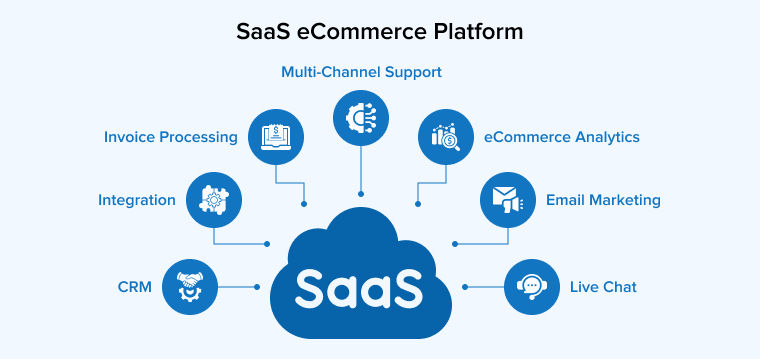Did you know that the global ecommerce market is projected to reach trillions in the next few years? In today’s digital landscape, having a strong online presence is no longer optional – it’s essential for business survival and growth.
That’s where ecommerce SaaS comes in. Ecommerce SaaS, or Software as a Service, offers businesses a ready-made, cloud-based platform to build and manage their online stores without the complexities and costs of traditional development. Think of it as your all-in-one toolkit for everything from product listings and payment processing to marketing and customer service.
This article will delve into the world of ecommerce SaaS, exploring its benefits, key features, and how it can empower you to create a thriving online business, regardless of your technical expertise or budget. We’ll also tackle common challenges and provide valuable insights to help you choose the right SaaS solution for your specific needs, ensuring your online store is set up for success.
Unlocking E-commerce Growth: Is SaaS the Key?
E-commerce is booming! To thrive, businesses need robust platforms. Software as a Service (SaaS) offers a compelling solution. It provides scalability and flexibility that traditional systems struggle to match.
But what exactly is e-commerce SaaS? Think of it as renting a powerful online store. You access the software over the internet. No hefty upfront costs or complex server management required.
This model lets you focus on what matters: building your brand. Forget wrestling with technical headaches. Instead, concentrate on crafting compelling product stories. And driving those crucial sales.
SaaS solutions are constantly evolving. New features and security updates are rolled out seamlessly. This keeps you ahead of the curve and your business secure.
The Allure of E-commerce SaaS: Why Choose It?
E-commerce SaaS isn’t just a trend; it’s a smart choice. Its advantages are considerable. This makes it an attractive option for online retailers of all sizes.
One of the biggest perks? Lower upfront costs. No need to invest in expensive hardware and software licenses. This frees up capital for other vital areas.
Scalability is another key benefit. As your business expands, your platform grows with you. Simply adjust your subscription plan to accommodate increased traffic and sales.
Plus, SaaS platforms often integrate smoothly with other tools. Think marketing automation, CRM, and accounting software. Streamlining your workflows is now easier than ever.
Security is also paramount. SaaS providers invest heavily in protecting your data. This includes safeguarding customer information and preventing fraud. This is something you might struggle to manage on your own.
Finally, many SaaS solutions offer excellent customer support. This is important for getting help with anything from initial setup to troubleshooting ongoing issues.
Navigating the E-commerce SaaS Landscape: What to Look For
The e-commerce SaaS market is crowded. Choosing the right platform can feel overwhelming. But knowing what to look for makes it much easier.
First, consider your specific business needs. What kind of products do you sell? What level of customization do you require? And what is your budget?
Think about the platform’s ease of use. Is it intuitive and user-friendly? Can you easily manage your products, orders, and customer data?
Also, evaluate the platform’s features. Does it offer the functionalities you need? Such as marketing tools, shipping integrations, and payment gateways?
Explore the available integrations. Does the platform connect seamlessly with your existing systems? This can save you time and effort in the long run. A key integration to consider is marketing automation.
Don’t forget to check out the platform’s security features. What measures are in place to protect your data? Is the platform PCI compliant? Data is the most valuable aspect of any business.
SaaS vs. Traditional E-commerce Platforms: A Head-to-Head
The choice between SaaS and traditional platforms is crucial. Both have pros and cons. Understanding these distinctions is key to making the right call.
Traditional platforms require upfront investment in hardware and software. You’re responsible for maintenance and updates. Think of it as buying a house. You handle everything.
SaaS platforms, on the other hand, operate on a subscription model. The provider handles the technical aspects. This frees you to focus on growing your business. Like renting an apartment, you’re off the hook for repairs.
Traditional platforms offer more customization. This is great for complex needs. But it also demands technical expertise. You can tweak every detail.
SaaS platforms prioritize ease of use and scalability. Customization options are usually more limited. But the trade-off is often worth it for most businesses.
Ultimately, the best choice depends on your unique circumstances. Consider your budget, technical expertise, and long-term goals. Weigh the advantages and drawbacks of each option.
Future Trends in E-commerce SaaS: What’s on the Horizon?

The e-commerce SaaS space is dynamic and constantly evolving. Keep an eye on emerging trends. This will help you stay competitive in the long run.
One major trend is the rise of AI-powered features. Expect to see more AI-driven product recommendations. And personalized customer experiences. This helps to tailor the experience to each customer.
Another trend is the increasing importance of mobile commerce. SaaS platforms are optimizing for mobile devices. Making it easier for customers to shop on the go.
Headless commerce is also gaining traction. This separates the front-end from the back-end. Allowing for greater flexibility and customization. This enables easier integration of new technologies.
Sustainability is becoming a key concern. E-commerce businesses are looking for ways to reduce their environmental impact. SaaS platforms are helping with features that promote eco-friendly practices. These eco-friendly practices are extremely important to new and older generations alike.
Finally, expect to see more emphasis on data security and privacy. As regulations become stricter, SaaS platforms are beefing up their security measures. Ensuring compliance and protecting customer data.